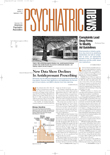At each Institute on Psychiatric Services (IPS) the workshops led by APA/Bristol-Myers Squibb Public Psychiatry Fellows are highly anticipated. Fellows are selected based on their leadership potential in public systems of care as well as their interest in psychiatric services for the seriously ill and underserved populations. These are the 2004-2006 fellows:
•
Lorrie Garces, M.D., University of Florida
•
C. Britt Peterson, M.D., M.P.H., University of New Mexico
•
Mark Hubner, M.D., Wright State University
•
Naveen Thomas, M.D., M.P.H., University of North Carolina
•
Annette Matthews, M.D., Oregon Health and Science University
•
Judy Greene, M.D., Harvard Longwood
•
Farah Munir, D.O., Cleveland Clinic Foundation
•
Sarah Polfliet Barrios, M.D., University of California, San Francisco
•
Matthew Hurford, M.D., University of Pennsylvania
•
Diane McLean, M.D., Ph.D., M.P.H., Columbia University
During the 2005 IPS, the public psychiatry fellows will share their thoughts on various key issues including collaborations involving psychiatric systems and faith-based organizations, innovative programs addressing unmet needs of underserved populations, and complementary and alternative treatment practices.
The road to recovery for psychiatric patients is fraught with stigma and access difficulties. Faith-based organizations can be a critical bridge for persons with psychiatric disorders. Garces' and Peterson's interest in the effects of spirituality and mental health care experiences have led them to explore this area in depth. In their workshop, “Collaborative Partnerships: Community Psychiatry and Communities of Faith,” they plan to further participants' understanding by examining how psychiatric systems interface with faith-based systems. The workshop faculty will highlight programs that have linked these two domains and will explore the treatment and education models at the core of these programs. It will be held on Thursday, October 6, from 8 a.m. to 9:30 a.m.
“Innovation” is the key for Hubner, Thomas, Matthews, and Greene as they consider new ways to meet the needs of underserved populations. Their workshop, “Developing Innovative New Programs in Community Mental Health Settings,” will include Anita Everett, M.D., as discussant. She is the senior medical advisor to the Substance Abuse and Mental Health Services Administration. The workshop will be held on Friday, October 7, from 8 a.m. to 9:30 a.m. and will examine innovative programs across the United States. From a program that addresses the unmet needs of North Carolina Latinos to an Oregon program that aims to prevent morbidity from methamphetamines, attendees will learn about the types of community collaborations required to meet the needs of these populations.
Munir, Barrios, Hurford, and McLean will lead the workshop “Herbs, Needles, and Gardens: Complementary and Alternative Treatment Approaches in Psychiatry” on Thursday, October 6, from 10 a.m. to 11:30 a.m. They note that “mental health providers are often overwhelmed by the task of attempting to merge alternative therapies with traditional psychiatric practice.” This is a concern given that “almost one-third of consumers in the United States are using alternative and complementary therapies for medical conditions.” This workshop will lay the foundation for “traditional” practitioners to embrace the diverse perspectives of providers and consumers of alternative therapies. ▪
